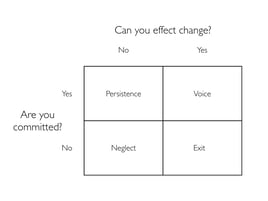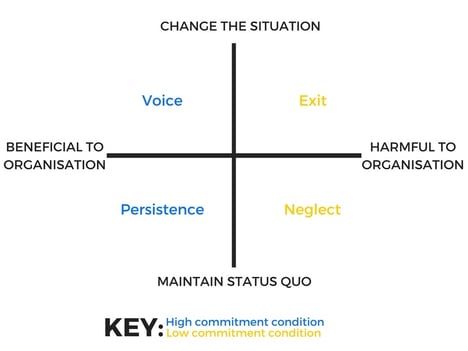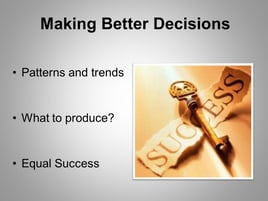 When you lead or manage a business for any length of time, you find people in your organization who have attitude problems.
When you lead or manage a business for any length of time, you find people in your organization who have attitude problems.
When you fail to hire correctly, they begin this way. In many cases, an employee becomes dissatisfied, and then….
Quits Before Leaving
In Adam Grant’s Originals, Grant cites economist Albert Hirschman, book, Exit, Voice, and Loyalty: Responses to Decline in Firms, Organizations, and States, sharing four different options for handling a dissatisfying situation. Whether you’re unhappy with your job, your marriage, or your government, decades of research show that you have a choice between exit, voice, persistence, and neglect.
Whether you’re unhappy with your job, your marriage, or your government, decades of research show that you have a choice between exit, voice, persistence, and neglect.
- Exit means removing yourself from the situation altogether: quitting a miserable job, ending an abusive marriage, or leaving an oppressive country.
- Voice involves actively trying to improve the situation: approaching your boss with ideas for enriching your job, encouraging your spouse to seek counseling, or becoming a political activist to elect a less corrupt government.
- Persistence is gritting your teeth and bearing it: working hard even though your job is stifling, sticking by your spouse, or supporting your government even though you disagree with it.
- Neglect entails staying in the current situation but reducing your effort: doing just enough at work not to get fired, choosing new hobbies that keep you away from your spouse, or refusing to vote.
 These choices are based on feelings of control and commitment.
These choices are based on feelings of control and commitment.
Do you believe you can effect change, and do you care enough to try? If you believe you’re stuck with the status quo, you’ll choose neglect when you’re not committed, and persistence when you are. If you do feel you can make a difference, but you aren’t committed to the person, country, or organization, you’ll leave.
Only when you believe your actions matter and care deeply will you consider speaking up.
A Better Boss – Supportive or Disagreeable?
 At work, our sense of commitment and control depends more on our direct boss than on anyone else. When we have a supportive boss, our bond with the organization strengthens and we feel a greater span of influence. In Originals Grant describes one characters boss as “prone to cynicism and mercurial.” Her portrait of him fits the profile of a more disagreeable manager, one with a critical, skeptical stance toward others. Disagreeable managers are typically the last people we seek when we’re going to go out on a limb, but they are sometimes our best advocates.
At work, our sense of commitment and control depends more on our direct boss than on anyone else. When we have a supportive boss, our bond with the organization strengthens and we feel a greater span of influence. In Originals Grant describes one characters boss as “prone to cynicism and mercurial.” Her portrait of him fits the profile of a more disagreeable manager, one with a critical, skeptical stance toward others. Disagreeable managers are typically the last people we seek when we’re going to go out on a limb, but they are sometimes our best advocates.
As much as agreeable people may love us, they often hate conflict even more. Their desire to please others and preserve harmony makes them prone to backing down instead of sticking up for us. “Because agreeable people value cooperation and conform to norms, they should not be inclined to make waves and upset interpersonal relationships,” management researchers Jeff LePine and Linn Van Dyne write after studying voice. It is often the prickly people who are more comfortable taking a stand against others and against convention. A Google employee put it, disagreeable managers may have a bad user interface but a great operating system.
In a study led by psychologist Stéphane Côté, it was discovered, agreeable people are happiest in the moments they dole out compliments and praise, smile and laugh with others, express affection, reassure others, and compromise or make concessions to please others.
Disagreeable people, in contrast, experience the greatest joy when they criticize, confront, or challenge others.
Key Point: In the decision to speak up, whom we choose as our audience matters as much as how we deliver our message. When we speak up to agreeable audiences, their instinct is to nod and smile. They accommodate to avoid conflict, shy away from critical feedback.
Disagreeable managers are more inclined to challenge us, improving our ability to speak up effectively.
Instead of speaking up to audiences who are highly agreeable, we’re better off targeting suggestions to people with a history of originality. Research shows that when managers have a track record of challenging the status quo, they tend to be more open to new ideas and less threatened by contributions from others. They care more about making the organization better than about defending it as it stands. They’re motivated to advance the organization’s mission, which means they’re not so loyal that they turn a blind eye to its shortcomings.
Middle Management Insecurity Stifles Innovation
Social scientists have discovered a middle-status conformity effect. If you’re perched at the top, you’re expected to be different and therefore have the license to deviate. Likewise, if you’re still at the bottom of a status hierarchy, you have little to lose and everything to gain by being original. But the middle segment of that hierarchy—where the majority of people in an organization are found—is dominated by insecurity.
When you have a bit of respect, you value your standing in the group. You don’t want to jeopardize it. To maintain and then gain status, you play a game of follow-the-leader, conforming to prove your worth as a group member. As sociologist George Homans observed, “Middle-status conservatism reflects the anxiety experienced by one who aspires to a social station but fears disenfranchisement.” The fall from low to lower hardly hurts; the fall from middle to low is devastating.
Middle-status conformity leads us to choose the safety of the tried-and-true over the danger of the original.
 As a leader you need to understand this. When searching for innovative ideas in your company, ideas to help you Outthink the Competition, you are more likely to discover these ideas at the top and the bottom of your businesses hierarchy than in the middle.
As a leader you need to understand this. When searching for innovative ideas in your company, ideas to help you Outthink the Competition, you are more likely to discover these ideas at the top and the bottom of your businesses hierarchy than in the middle.
Growth demands Strategic Discipline.
Positioning Systems helps mid-sized ($5M - $250M) business Scale-UP. We help you align everyone in your business to focus on Your One Thing! To achieve growth, you need to evolve in today’s rapidly changing economic environment. Are you avoiding a conversation with yourself on how to can grow your business? Contact dwick@positioningsystems.com to Scale Up your business! Take our Four Decisions Needs Assessment to discover how your business measures against other Scaled Up companies. We’ll contact you.
Next Blog – Decisions Equal Success/Failure
 Two new movies, The Post and Darkest Hour reveal the critical nature of decision-making. In Darkest Hour, Winston Churchill’s war council urged him to negotiate peace with Hitler, rather than fight on against incredible odds. Katharine Graham the first female publisher of The Washington Post was told by her lawyers and advisory council not to expose a massive cover-up of government secrets that spans three decades and four U.S. presidents. Four Decisions: People, Strategy, Execution, and Cash drive business growth. Next blog we explore why decision-making keys success and what the most important decision you need to make now to survive.
Two new movies, The Post and Darkest Hour reveal the critical nature of decision-making. In Darkest Hour, Winston Churchill’s war council urged him to negotiate peace with Hitler, rather than fight on against incredible odds. Katharine Graham the first female publisher of The Washington Post was told by her lawyers and advisory council not to expose a massive cover-up of government secrets that spans three decades and four U.S. presidents. Four Decisions: People, Strategy, Execution, and Cash drive business growth. Next blog we explore why decision-making keys success and what the most important decision you need to make now to survive.






.jpeg?width=150&height=135&name=Hand%20with%20marker%20writing%20the%20question%20Whats%20Next_%20(1).jpeg)

